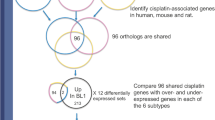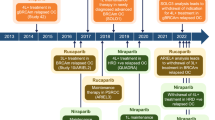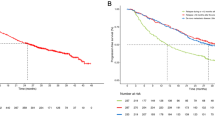Abstract
Objectives
Docetaxel-based chemotherapy is effective in patients with castration-resistant prostate cancer (CRPC). This phase II study assessed the outcome and predictive factors for prognosis and toxicity following intermittent chemotherapy with docetaxel, estramustine phosphate, and carboplatin (DEC) in patients with CRPC.
Methods
Thirty-five patients were treated with a DEC regimen that consisted of a 28-day cycle of drugs as follows: docetaxel (60 mg/m2 on day 1), carboplatin (AUC 5 on day 1) and estramustine phosphate (560 mg daily). Treatment was continued intermittently. The end point was to test the effect of DEC on the response rate and overall survival (OS). Statistical correlations between the outcomes and predictive factors, including clinical parameters and 8 single-nucleotide polymorphisms (SNPs) related to drug metabolism, were assessed.
Results
Prostate-specific antigen levels decreased by more than 30% in 65.7% of the patients. The median OS following DEC was 17.8 months, and the median total time of chemotherapy holiday was 7.7 months (range 1.7–35.8). On multivariate analysis, serum lactate dehydrogenase (LDH) was an independent prognostic factor for OS (p = 0.007). On SNP analysis, patients carrying the TT genotype of the ABCB1 C3435T polymorphism showed a significantly more severe leukocytopenia during the first cycle of DEC therapy compared to patients with the CC + CT genotype (p = 0.036).
Conclusion
Combination chemotherapy with DEC has a potential effect on CRPC with acceptable toxicity. Serum LDH may be a promising predictor of prognosis, and the ABCB1 C3435T polymorphism may be a genetic predictor of the severity of leukocytopenia in patients with CRPC treated with DEC.


Similar content being viewed by others
References
Jemal A, Siegel R, Ward E et al (2008) Cancer statistics, 2008. CA Cancer J Clin 58:71–96
Petrylak DP, Tangen CM, Hussain MH et al (2004) Docetaxel and estramustine compared with mitoxantrone and prednisone for advanced refractory prostate cancer. N Engl J Med 351:1513–1520
Tannock IF, de Wit R, Berry WR et al (2004) Docetaxel plus prednisone or mitoxantrone plus prednisone for advanced prostate cancer. N Engl J Med 351:1502–1512
Regan MM, O’Donnell EK, Kelly WK et al (2010) Efficacy of carboplatin–taxane combinations in the management of castration-resistant prostate cancer: a pooled analysis of seven prospective clinical trials. Ann Oncol 21:312–318
Soga N, Kato M, Nishikawa K et al (2009) Intermittent docetaxel therapy with estramustine for hormone-refractory prostate cancer in Japanese patients. Int J Clin Oncol 14:130–135
Tsuchiya N, Wang L, Suzuki H et al (2006) Impact of IGF-I and CYP19 gene polymorphisms on the survival of patients with metastatic prostate cancer. J Clin Oncol 24:1982–1989
Tsuchiya N, Inoue T, Narita S et al (2008) Drug related genetic polymorphisms affecting adverse reactions to methotrexate, vinblastine, doxorubicin and cisplatin in patients with urothelial cancer. J Urol 180:2389–2395
Scher HI, Halabi S, Tannock I et al (2008) Design and end points of clinical trials for patients with progressive prostate cancer and castrate levels of testosterone: recommendations of the Prostate Cancer Clinical Trials Working Group. J Clin Oncol 26:1148–1159
Japanese Urological Association and the Japanese Society of Pathology (2001) General rule for clinical and pathological studies on prostatic cancer. Kanehara, Tokyo
Halabi S, Small EJ, Kantoff PW et al (2003) Prognostic model for predicting survival in men with hormone-refractory metastatic prostate cancer. J Clin Oncol 21:1232–1237
Halabi S, Vogelzang NJ, Kornblith AB et al (2008) Pain predicts overall survival in men with metastatic castration-refractory prostate cancer. J Clin Oncol 26:2544–2549
Kikuno N, Urakami S, Nakamura S et al (2007) Phase-II study of docetaxel, estramustine phosphate, and carboplatin in patients with hormone-refractory prostate cancer. Eur Urol 51:1252–1258
Beer TM, Ryan CW, Venner PM et al (2008) Intermittent chemotherapy in patients with metastatic androgen-independent prostate cancer: results from ASCENT, a double-blinded, randomized comparison of high-dose calcitriol plus docetaxel with placebo plus docetaxel. Cancer 112:326–330
Sierko E, Wojtukiewicz MZ (2004) Platelets and angiogenesis in malignancy. Semin Thromb Hemost 30:95–108
Helley D, Banu E, Bouziane A et al (2009) Platelet microparticles: a potential predictive factor of survival in hormone-refractory prostate cancer patients treated with docetaxel-based chemotherapy. Eur Urol 56:479–484
Kimchi-Sarfaty C, Oh JM, Kim IW et al (2007) A “silent” polymorphism in the MDR1 gene changes substrate specificity. Science 315:525–528
Sissung TM, Baum CE, Deeken J et al (2008) ABCB1 genetic variation influences the toxicity and clinical outcome of patients with androgen-independent prostate cancer treated with docetaxel. Clin Cancer Res 14:4543–4549
Acknowledgments
We thank Yukiko Sugiyama and Yoko Mitobe for their excellent technical assistance.
Conflict of interest
No author has any conflict of interest.
Author information
Authors and Affiliations
Corresponding author
About this article
Cite this article
Narita, S., Tsuchiya, N., Yuasa, T. et al. Outcome, clinical prognostic factors and genetic predictors of adverse reactions of intermittent combination chemotherapy with docetaxel, estramustine phosphate and carboplatin for castration-resistant prostate cancer. Int J Clin Oncol 17, 204–211 (2012). https://doi.org/10.1007/s10147-011-0275-6
Received:
Accepted:
Published:
Issue Date:
DOI: https://doi.org/10.1007/s10147-011-0275-6




